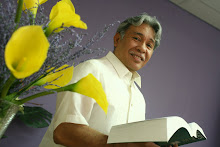By: Mary Alice G. Rosero
I should warm the reader: this is a biased piece. It is difficult to be objective when talking about art; more so, when talking about the artist whose passion for his work defies description.
Segundo C. Dizon’s life as an artist and teacher is a drama unfolding before your eyes. but unlike a traditional play with a clear setting, characters and a conflict that builds up into a climax which eventually resolves itself, Dodi’s life consists of a parade of amorphous scenes – some tragic, some happy and even hilarious, some sad, and others grand scenes of triumph – all of which shaped the passion of the artist that is Dodi.
Born of poor farming parents (the father later joined the Armed Forces), Dodi was the youngest in a brood of five. His childhood was surrounded by mysteries, only talked about it in hushed tones, which the sensitive and impressionable young Dodi absorbed. The mysterious circumstances of the death of his mother, the remarriage of his father, a sibling who would later die of unnatural causes, the deaths of another brother and sister, are elements of a telenovela that was not fiction, but as real as can be. These events could have turned a highly sensitive boy into a rebel. However, Dodi redirected the pain and the anger these tragedies may have brought forth, into the arts, specifically in a medium as expensive as stage.
It was in college where he found the outlet of the mixed hues of emotions that have lain buried in his heart for many years – the stage. He found his true calling when he first played the role of Carding in Alberto Florentino’s play, “Cadaver” that won him the best supporting actor award from the now defunct Citizens’ Council for Mass Media. He graduated on to do more demanding roles such as Awiyao in “The Wedding Dance” , Cacique in “Bayaning Huwad”, Elises in “Paglilitis ni Andres Bonifacio”, Menandro in “Florante at Laura”, Rizal in “Leonor Rivera”, Hoke Coleburn in “Driving Miss Daisy”, and Don Ramon in Inulilang Tahanan (The Forsaken H0use). The characters he has played span a gamut of human characterizations: the tragic Hamlet, the romantic and sacrificing Cyrano de Bergerac, the scheming Padre Damaso (“El Filibusterismo”), the brave Lapu-Lapu, the philosophical Tao (“Ang Tao”), and even the comic Totoy (“New Yorker in Tondo”).
But the stage was not Dodi’s first calling. He is first and foremost a teacher. But even in a profession as serious and structured as teaching, Dodi, the artist performs his best. The artist in him made him to come up with creative ways to make his students read and appreciate literature. It is not unusual for Dodi to start a lecture with an amusing cartoon sketched on the board, or to punctuate his lecture in dramatic one-liners delivered with great intensity. While he considers himself a “terror teacher” as he does not compromise on quality, his students just love him. It is no wonder that he holds the record of having been evaluated consistently “Outstanding” since he started teaching in PUP in 1974. On-stage and off-stage, Dodi performs his job with excellence.
It is not only the regular students who consider Dodi as an excellent teacher, but also his colleagues who have had the opportunity of being directed by him in a number of productions. Unabashedly, Dodi declares that he has brought the actors on the persons of Dr. Juan C. Birion, Dr. Amalia Rosales, Dr. Milagros Canares, Prof. Belen Bucao, former Prof. Erlinda Dizon, Prof. Pacelli Eugenio, Prof. Elmer de Jose, among others. He has also taught young professors like Kriztine and Reylan Viray the ins and out of stage production. Not only is he a jack-of-all-trades in stage production, but his artistry lies in his ability to impart these skills to anyone willing to learn. As he is often quoted, “In everything I do, I always play my roles on performance-level.
As he did, even his roles in private life. The few persons who really know him have witnessed how intensely he can love. He may not be demonstrative, having been raised in traditional, formal family, but he nevertheless does not lack ways of showing his affection. At the gala performance of the “Wedding Dance” at the Philamlife Theater exactly twenty-six years ago, Dodi, fully made-up and dressed only in G-strings, feather sticking out of his headband, came from the back entrance door and walked through the mesmerized audience, carrying on his arms his wife, Alice who could not walk because of crippling arthritis, and sat her in the front row of the theater. During curtain call, he gratefully thanked his wife for inspiring him to perform his best. It was difficult to determine at that time if the cheering audience was applauding his performance as Awiyao or as Dodi, the husband.
Peter Burger, a humanist sociologist, must have been thinking of Dodi when he said that human play dramatic parts in the grand play of society, and that they are the masks that they wear to play their roles. “A person’s biography now appears to us an uninterrupted sequence of stage performances, played to different audiences, sometimes involving drastic changes of costumes, always demanding that the actor be what he is playing.” And this, Dodi continues to live up to passionately.

No comments:
Post a Comment